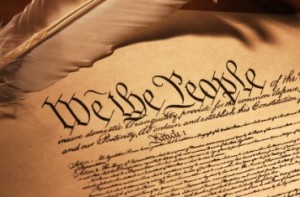President Obama and Justice Ginsburg on America’s “Rather Old Constitution”
 I’ve gotten some very interesting emails regarding President Obama’s mandate commanding Roman Catholics (and many evangelical Protestants) to violate their consciences by providing mandatory contraception, sterilization, and abortion-inducing pharmaceuticals. The emailers noted that Obama’s action will force Catholics to challenge the president in court, particularly given that bishops are saying they will not comply with the law. It could mean another constitutional showdown over “Obama-care,” one that could likewise end up in the Supreme Court. Imagine: “The Catholic Bishops v. Obama.”
I’ve gotten some very interesting emails regarding President Obama’s mandate commanding Roman Catholics (and many evangelical Protestants) to violate their consciences by providing mandatory contraception, sterilization, and abortion-inducing pharmaceuticals. The emailers noted that Obama’s action will force Catholics to challenge the president in court, particularly given that bishops are saying they will not comply with the law. It could mean another constitutional showdown over “Obama-care,” one that could likewise end up in the Supreme Court. Imagine: “The Catholic Bishops v. Obama.”
What a fitting capstone to the Obama presidency. And imagine that a majority of professing Roman Catholics elected this man in November 2008.
If this issue goes to the high court, I wouldn’t bet my money on Obama, even with the two new “pro-choice,” pro-Roe liberals he added to the bench: Elena Kagan and Sonia Sotomayor. Even the most “progressive” Supreme Court justice cannot avoid that old freedom-of-religion thing in the First Amendment.
All of that is remarkable enough. But I find it especially ironic given two other fascinating current news item relating to the Constitution:
Last week, President Obama did an interview with NBC’s Matt Lauer. Obama expressed frustration at his inability to be the “transformational political figure” Americans elected. The “change agent” lamented that this was the fault of the American Founders—who Obama refers to as “men of property and wealth”—and their Constitution. Obama told Lauer:
What’s frustrated people is that I have not been able to force Congress to implement every aspect of what I said in 2008. Well, it turns out our Founders designed a system that makes it more difficult to bring about change that I would like sometimes. But what I have been able to do is move in the right direction. And what I’m going to keep on doing is plodding away, very persistent.
Ah, that old Constitution again.
Obama is quite correct. His primary obstacle is the Founders’ system of separation of powers and checks and balances. His problem is a Congress and Supreme Court that is empowered to say, “No, Mr. President, that isn’t constitutional. You can’t do that in America.”
Well, Obama’s mandate to the Catholic Church could be the next such challenge, again impeding his self-perceived rise to transcendent political greatness. A Democrat-controlled Congress approved Obama-care, but the Supreme Court now must scrutinize its provisions. That’s the court’s duty.
That brings me to the second news item:
Supreme Court Justice Ruth Bader Ginsburg gave an interview to Egyptian television. Ginsburg will likely be the next justice to step down. Once Obama replaces her with a much younger pro-Roe judge, this nation will have Roe v. Wade for another 39 years. In the interview, Ginsburg advised Middle East democrats on drafting a constitution. She did not, however, recommend the U.S. Constitution. Ginsburg stated:
I can’t speak about what the Egyptian experience should be, because I’m operating under a rather old constitution. The United States, in comparison to Egypt, is a very new nation; and yet we have the oldest written constitution still in force in the world…
I would not look to the U.S. Constitution if I were drafting a constitution in the year 2012. I might look at the constitution of South Africa. That was a deliberate attempt to have a fundamental instrument of government that embraced basic human rights, and had an independent judiciary… It really is, I think, a great piece of work that was done. Much more recently than the U.S. Constitution, Canada has a Charter of Rights and Freedoms. It dates from 1982. You would almost certainly look at the European Convention on Human Rights. Yes, why not take advantage of what there is elsewhere in the world?
Actually, why not take advantage of what’s in the U.S. Constitution? The paradox in Ginsburg’s statement is her dismissal of the U.S. Constitution because it’s “rather old;” in fact, “the oldest written constitution still in force in the world.”
Well, why is it so old and still in force? Because it was done right. It is based on timeless values and virtues and universal rights that work; that are true. It has been amended less than 30 times in 220-some years. It is the most stable, successful, remarkable constitution in history, bringing together a vast array of peoples and assimilating them into history’s most prosperous, awe-inspiring nation—a nation that spent the 20th century winning freedom for other nations, so those nations could produce democracies and constitutions. The U.S. Constitution is the perfect model, at once both beautifully broad and specific.
And among the things it got right are separation of powers and checks in balances. Ruth Bader Ginsburg and President Obama may be learning that again very soon—compliments of Obama-care and its constitutional assault on the consciences of religious believers.

